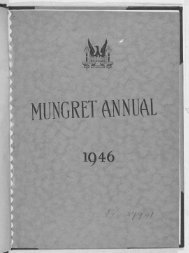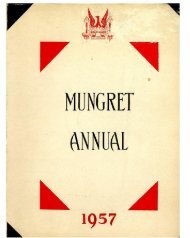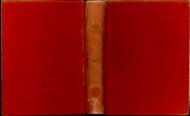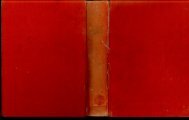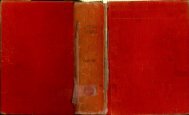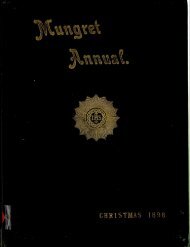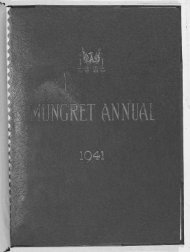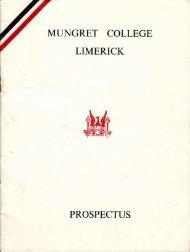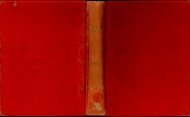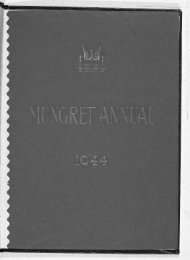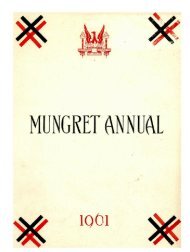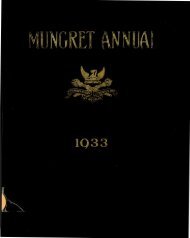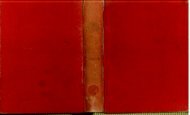Download the Mungret College Annual 1968 - Mungret College Past ...
Download the Mungret College Annual 1968 - Mungret College Past ...
Download the Mungret College Annual 1968 - Mungret College Past ...
You also want an ePaper? Increase the reach of your titles
YUMPU automatically turns print PDFs into web optimized ePapers that Google loves.
every institution formerly taken for granted.<br />
Everything is changing - you, your family,<br />
your neighbourhood, your education, your<br />
job, your government, your relation to<br />
<strong>the</strong> o<strong>the</strong>rs.' And <strong>the</strong>y're changing dramatically."<br />
Thus, does Professor Marshall McLuhan<br />
of Fordham University sum up <strong>the</strong> tremendous<br />
influence of mass media on our<br />
world of today. We no longer live in a<br />
world affected by <strong>the</strong> printed word of book,<br />
review, magazine, or newspaper. We now<br />
have to contend with radio, TV. and films<br />
too. Put in its most basic and pragmatic<br />
form, <strong>the</strong>se are all wonderful media for<br />
propaganda, for selling a particular point of<br />
view. We witness this from day to day,<br />
watching <strong>the</strong> TV. reports on Vietnam and<br />
international reaction. World War II saw<br />
<strong>the</strong> Nazis use film to great effect for just<br />
this purpose. Goebbels, Minister for Propaganda,<br />
was a great believer in this means<br />
of communication. The film of Russian<br />
Sergei Eisenstein Battleship Potemkin he<br />
praised as an ideal model and urged German<br />
film-makers to glorify <strong>the</strong> Nazi "revolution"<br />
by similar films. Yet it was undoubtedly<br />
Lenin who first realised <strong>the</strong> power of <strong>the</strong><br />
medium when he said: " The cinema is for<br />
us <strong>the</strong> most important instrument of all <strong>the</strong><br />
arts."<br />
Renaissance Europe came up with an<br />
answer which aimed at helping man to use<br />
and control <strong>the</strong> power of <strong>the</strong> printed word<br />
- literary education. And this is still very<br />
much with us today. And it must be added<br />
that this is not a merely negative instrument<br />
guarding us in ultimate complacency. It<br />
really does help develop our every potential<br />
for living life to <strong>the</strong> full in <strong>the</strong> best Christian<br />
sense in society.<br />
Yet, <strong>the</strong>re is no doubt that <strong>the</strong> new forms<br />
of communication, especially cinema and<br />
television, demand a new form of education.<br />
The impact of <strong>the</strong>se electric media, <strong>the</strong>ir<br />
influence on our culture and civilization is<br />
unquestionable. Their power for good or<br />
had is magnified far beyond <strong>the</strong> scope of<br />
<strong>the</strong> printed word. Our attitude in this<br />
country leaves a lot to be desired. Far too<br />
often cinema and television are considered<br />
to be nothing more than means of mere<br />
entertainment: means of relaxation not to<br />
he taken seriously.<br />
Certainly, cinema is entertainment. It<br />
is also - and inescapably - a means to<br />
education and culture. Even a filin that is<br />
mere entertainment educates and influences<br />
Culture because it implies some attitude to<br />
42<br />
life, it communicates background pre-suppositions,<br />
interpretations of history and of<br />
current affairs. The impact of cinema and<br />
TV cannot be escaped and <strong>the</strong>refore it must<br />
be controlled. But it can only be truly controlled<br />
in <strong>the</strong> minds, imaginations and hearts<br />
of <strong>the</strong> audiences. Hence education,"<br />
—VISION, Summer, 1965: article by<br />
Fr. J. Kelly, S.J., (to whom [ am indebted<br />
for many of <strong>the</strong> ideas presented<br />
here).<br />
In our own small way, we have tried to<br />
initiate such a programme. The need had<br />
been felt for some time past. And so, after<br />
Christmas, as a logical extension to <strong>the</strong><br />
scope of our normal film shows, Cineforwo<br />
- a film appreciation group - was created.<br />
Fourth, Fifth and Sixth Year were eligible<br />
for membership. Choice of <strong>the</strong> year's programme<br />
of films was dictated by a wish to<br />
project an above-average selection of ordinary,<br />
common-or-garden-type English and<br />
American movies, as <strong>the</strong> following list will<br />
show:—<br />
Key Largo (John Huston).<br />
The Big Country (William Wyler).<br />
Moving Target (Jack Sm ight).<br />
Behold A Pale Horse (Fred Zinneman).<br />
Hoodlum Priest (Irvin Kcrsh ner).<br />
Mei'il/'s Marauders (Samuel Fuller).<br />
The Best of Enemies (Guy Hamilton).<br />
The Iperess File (Sidney J. Furie).<br />
I Con fss (Alfred Hitchcock).<br />
Red River (Howard Hawks).<br />
Tunes of Glory (Ronald Neame).<br />
Sapphire (Basil Dearden).<br />
The Maltese Falcon (John Huston).<br />
Charade (Stanley Donen).<br />
Discussions followed <strong>the</strong> projection of<br />
films in <strong>the</strong> second term. It was heartening<br />
to see <strong>the</strong> large numbers in attendance.<br />
Story-line, technique and point-of-view were<br />
Slowly unravelled. Most had something to<br />
contribute and many of <strong>the</strong> critiques were<br />
succinct and well-expressed. Supplementary<br />
to this, we tried to have a weekly meeting<br />
with a more technical bias. Education was<br />
<strong>the</strong> order of <strong>the</strong> day. Film strips on technique<br />
and aes<strong>the</strong>tics were shown. We even<br />
had two film extracts: one from John Ford's<br />
classic western Stagecoach, and <strong>the</strong> o<strong>the</strong>r,<br />
<strong>the</strong> famous steps sequence from Eisenstein's<br />
Battleship Potemkin (recently shown on<br />
RTE). Again, discussion followed and <strong>the</strong>n<br />
a re-showing. A small reference library is<br />
in <strong>the</strong> making.<br />
This has been a small beginning, but an<br />
encouraging one. Interest is definitely <strong>the</strong>re.<br />
Limerick is usually favoured with a great<br />
variety of musical events, and a number of<br />
<strong>the</strong>se were attended by <strong>Mungret</strong> students<br />
during <strong>the</strong> school year.<br />
The first was on <strong>the</strong> occasion of <strong>the</strong> return<br />
visit of <strong>the</strong> famous Bamberg Symphony<br />
Orchestra to Limerick. For Fritz Rciger,<br />
<strong>the</strong> conductor, this was a first appearance<br />
here. The programme included Symphony<br />
NC). 36 in C (" The Linz ") by Mozart;<br />
Symphonic Poem " Don Juan '' by Richard<br />
Strauss, and Symphony No. 7 in A, Opus 92<br />
by Beethoven. The feeling put into Strauss's<br />
work captured <strong>the</strong> attention and appreciation<br />
Of <strong>the</strong> students present. It was brilliantly<br />
performed and showed Strauss's astonishing<br />
ingenuity in <strong>the</strong> handling of <strong>the</strong> orchestra.<br />
Two nights later in this weekend of music<br />
<strong>the</strong> R.T. E. Symphony Orchestra performed<br />
Symphony No. 28 in C by Mozart and<br />
Symphony No. 7 in D minor by Dvorak. The<br />
soloist Tamas Vasary, especially in <strong>the</strong> final<br />
movement (The Allegro Vivace) of Chopin's<br />
Piano Concerto No. 2 in F minor, gave an<br />
exhilarating display of his mastery of <strong>the</strong><br />
piano. The youthfulness of both conductor<br />
and soloist made a special appeal to <strong>the</strong><br />
young listeners.<br />
To widen <strong>the</strong>ir interest in <strong>the</strong> musical field<br />
<strong>Mungret</strong> students attended <strong>the</strong> dress re-<br />
I've 0/?en thought of wandering<br />
The ways and pat/is of dreams,<br />
I'd saddle up my dreamhorse<br />
And go uheree,' she deems;<br />
I'd ride up to <strong>the</strong> heavens<br />
And play with my favourite star,<br />
I'd ride to Mount Olympus<br />
To gods in time afar;<br />
Vusic<br />
lota4 aj 24eam4<br />
h,t' JOHN HURLEY (3rd Club)<br />
43<br />
hearsals of La Boheme and La Traviata,<br />
performed by <strong>the</strong> Limerick Choral and<br />
Operatic Society. These were attended mostly<br />
by <strong>the</strong> young school-going opera lovers.<br />
International guest artistes played <strong>the</strong> leading<br />
roles and displayed <strong>the</strong>ir wide experience in<br />
<strong>the</strong> realm of opera.<br />
The youth of Limerick were given, and<br />
took, <strong>the</strong> opportunity to prove <strong>the</strong>mselves<br />
as talented performers too. The Municipal<br />
School of Music Orchestra topped <strong>the</strong> bill<br />
with Trepak, a Russian dance by Morand,<br />
Polka from <strong>the</strong> opera Schwanda, <strong>the</strong> Bagpiper,<br />
and Mozart's Allegro in C (Church<br />
Sonata No. 12). A few of <strong>the</strong> musicians here<br />
played in this orchestra and so <strong>Mungret</strong><br />
students turned out in support of <strong>the</strong>ir<br />
colleagues in this Junior Concert.<br />
The major outing of <strong>the</strong> year was to <strong>the</strong><br />
Irish National Opera's performance of<br />
Mozart's Don Giovanni in <strong>the</strong> Crescent Hall.<br />
Veronica McSweeney, that talented young<br />
Irish musician, was unanimously acclaimed<br />
for her brilliant, lively production and piano<br />
accompanying. Peter MeBrien, with his<br />
natural charm and voice, was <strong>the</strong> perfect<br />
Don Giovanni. This was a line finale to our<br />
musical year and we hope such a standard<br />
will be maintained (luring <strong>the</strong> coining season.<br />
I'd ride along <strong>the</strong> freedom<br />
Of blue unclouded seas,<br />
D. DOLAN.<br />
I'd rest awhile, beside <strong>the</strong> Nile,<br />
'Neat/i <strong>the</strong> weeping willow trees.<br />
[ci ride my horse of mystery<br />
Whatever way she'd deem,<br />
But once again I'd wake up<br />
To find it all a dream.



